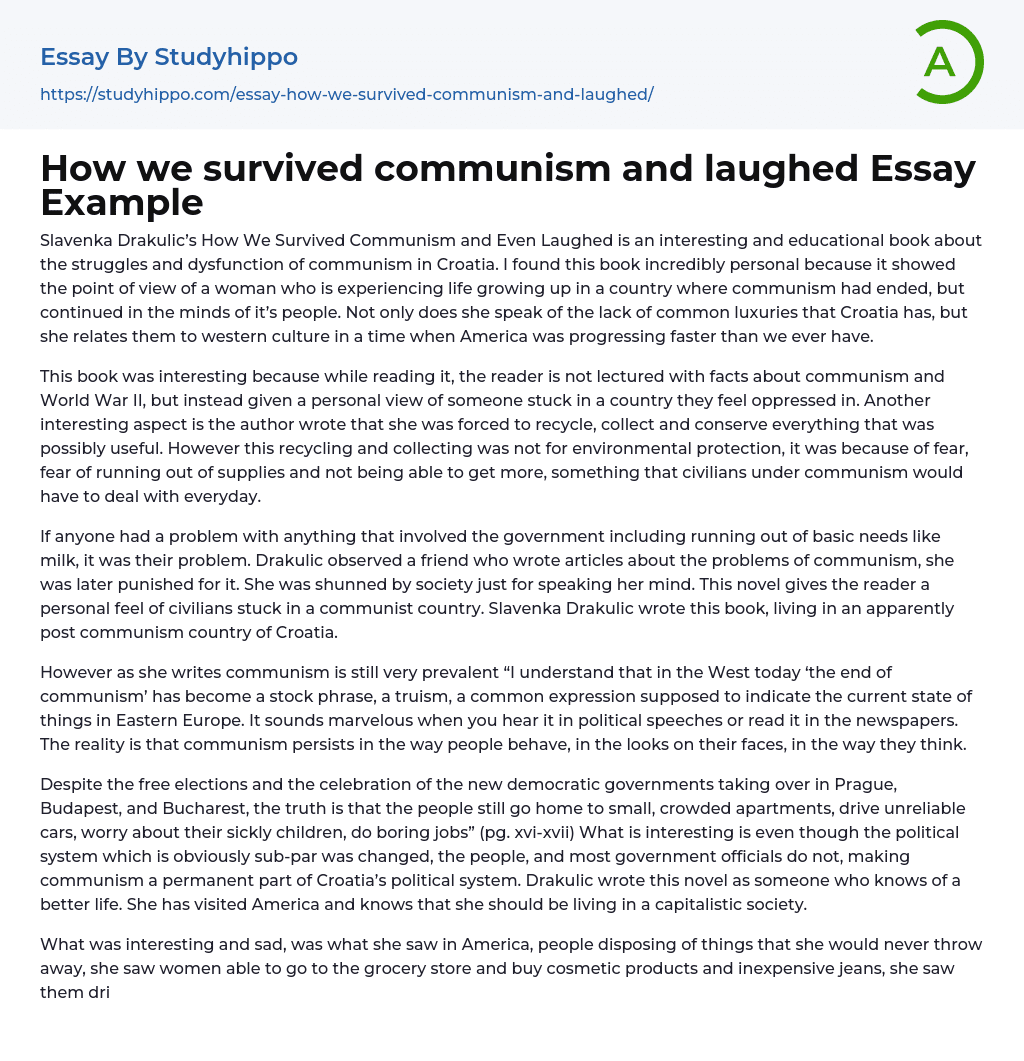Slavenka Drakulic’s How We Survived Communism and Even Laughed is an interesting and educational book about the struggles and dysfunction of communism in Croatia. I found this book incredibly personal because it showed the point of view of a woman who is experiencing life growing up in a country where communism had ended, but continued in the minds of it’s people. Not only does she speak of the lack of common luxuries that Croatia has, but she relates them to western culture in a time when America was progressing faster than we ever have.
This book was interesting because while reading it, the reader is not lectured with facts about communism and World War II, but instead given a personal view of someone stuck in a country they feel oppressed in. Another interesting aspect is the aut
...hor wrote that she was forced to recycle, collect and conserve everything that was possibly useful. However this recycling and collecting was not for environmental protection, it was because of fear, fear of running out of supplies and not being able to get more, something that civilians under communism would have to deal with everyday.
If anyone had a problem with anything that involved the government including running out of basic needs like milk, it was their problem. Drakulic observed a friend who wrote articles about the problems of communism, she was later punished for it. She was shunned by society just for speaking her mind. This novel gives the reader a personal feel of civilians stuck in a communist country. Slavenka Drakulic wrote this book, living in an apparently post communism country of Croatia.
style="text-align: justify">However as she writes communism is still very prevalent “I understand that in the West today ‘the end of communism’ has become a stock phrase, a truism, a common expression supposed to indicate the current state of things in Eastern Europe. It sounds marvelous when you hear it in political speeches or read it in the newspapers. The reality is that communism persists in the way people behave, in the looks on their faces, in the way they think.
Despite the free elections and the celebration of the new democratic governments taking over in Prague, Budapest, and Bucharest, the truth is that the people still go home to small, crowded apartments, drive unreliable cars, worry about their sickly children, do boring jobs” (pg. xvi-xvii) What is interesting is even though the political system which is obviously sub-par was changed, the people, and most government officials do not, making communism a permanent part of Croatia’s political system. Drakulic wrote this novel as someone who knows of a better life. She has visited America and knows that she should be living in a capitalistic society.
What was interesting and sad, was what she saw in America, people disposing of things that she would never throw away, she saw women able to go to the grocery store and buy cosmetic products and inexpensive jeans, she saw them driving nicer cars, and having the ability to take their children to the doctor, this is something Croatia lacked. Reading stories about people not being able to buy simple things like tampons, milk and cosmetic products, simply because there was nowhere to get them, gave a personal in depth
look at the horribleness of communism. The obvious question is why cant people change this?
Why can’t the citizens of Croatia speak out and protest? The answer to this question is people cant speak out because the communist run government will quickly strike them down, publicly humiliate them, and turn their opinions void. This is exactly what happened to one of Drakulic’s friends. “ Then she insulted and ridiculed the judicial system by showing that the parliament in the socialist republic of Croatia – as in every one party state – is only a formality. Her article, naive as it seems today, speaking ‘only’ about pinball machines, revealed the functioning and hypocrisy of the communist state.
She mocked it, and she had to be punished for that. ” (P. 4) “… in Tanja’s case it looked as if the editors were explaining to the public the severe ‘error’ that had occurred in the newspaper. But everyone knew that it was their token sackcloth and ashes, a declaration written for the party bosses, not for the public. ” (P. 4) What happened to this journalist is she became a social outcast; nobody would converse with her, or even drink coffee with her. She was still paid as a journalist but none of her articles were published, she essentially was made “invisible” by the government.
Tanja later committed suicide. This is only one example of communist oppression, there were many more like her. Reading How We Survived Communism and Even Laughed gave me a very interesting perspective of communism because Slavenka Draculic made this book feel personal. Along with many other things she wrote
about the difference between eastern and western culture. She wrote horrific stories of people getting excommunicated just for speaking their point of view. How We Survived Communism and Even Laughed is a book anybody who wants a real view of communist life style should read.


Unfortunately copying the content is not possible
Tell us your email address and we’ll send this sample there.
By continuing, you agree to our Terms and Conditions.


